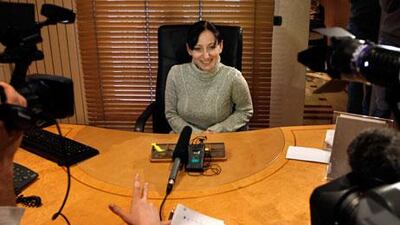MARSEILLE // Fear has driven Alexandra Blachère to lead a fight for what she sees as justice in the growing scandal of potentially dangerous breast implants affecting at least 300,000 women worldwide.
Mrs Blachère, 33, from the eastern French city of Besançon, has not yet suffered the burning pain many victims report as the implants - made from cheap industrial rather than higher-cost, medical-grade silicone gel - rupture or cause inflammation.
But prompted by the psychological effect of wondering whether - or when - her implants will prove defective, she is heading calls for a systematic, publicly funded campaign of removal and replacement.
The French government has offered only to meet the cost of removal unless the original treatment involved reconstruction after breast cancer.
Criminal charges will be filed against former executives of Poly Implant Prothese (PIP), the liquidated French company at the centre of the affair. Once the world's third-largest maker of breast implants, PIP is accused of risking the health of women in several European countries, South America, Australasia and elsewhere.
About 80 per cent of the silicone implants made by PIP at its laboratories on the Mediterranean coast at La Seyne-Sur-Mer, east of Marseille, were exported.
The company's saline implants sparked international concern almost 10 years before the French authorities forced the silicone versions off the market.
Mrs Blachère, the president of an association representing many of the 30,000 women in France who received implants, chose surgery for aesthetic reasons.
With the birth of each of her three children, she experienced reduced breast size - changes she found demoralising until she used savings and borrowed money to pay €3,420 (Dh16,423) for implants in 2008.
"The biggest outlay of my life, even more than for our car," she told Le Monde newspaper.
"We're looking at 300,000 to 400,000 potential victims in the world," said Mrs Blachere in another interview.
She said she had heard from women in Italy and Spain and also knew of cases in Venezuela and Brazil.
PIP's website said it exported to 60 countries.
What Mrs Blachère fears, women such as Melanie Schilling and her sister - who are among 40,000 British women thought to have received PIP implants - already suffer.
Both have three children and intend to have their implants removed to end their agony.
"Who knows what damage they are doing inside me or have already done?" Mrs Schilling, 34, from Luton, north of London, told The Sun newspaper.
"I am in constant pain and just want them removed. I think they're dangerous — like two ticking timebombs inside me."
Among the latest signs many more cases may yet come to light, Diane Bouhuijs, a Dutch health official, said about 1,000 women in the Netherlands may have paid for the same implants but under a different brand name.
Ms Bouhuijs said the products were rebranded as "M-implants" in Dutch marketing.
She said all the women concerned were being urged to consult their doctors.
The US Food and Drug Administration sent an investigator to inspect the production of saline implants at PIP's plant in 2000.
This was followed by a letter warning the company's founder, Jean-Claude Mas, that the products were "adulterated".
The investigation identified at least 11 suspected deviations from good manufacturing practice.
The charges to be brought against unnamed PIP executives over the silicone implants are for deception and fraud, according to prosecution sources quoted by the French media.
Mr Mas's lawyer, Yves Haddad, said on French radio this week his client, who is unable to walk after surgery for a vascular condition, and his former colleagues deny any wrongdoing.
Mr Haddad admitted one of the two gels used by PIP "has not been approved by French standards".
He said it had been "a problem of price and cost, and therefore profit", but added that the product had not been proven to be harmful.
Interpol has issued a red notice, similar to a warrant, for Mr Mas, 72, over drink-driving charges in Costa Rica in June last year.
* Additional reporting by Reuters


